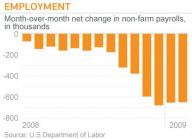U.S. economy sheds 651,000 jobs in February
By Lucia Mutikani

WASHINGTON (Reuters) - The U.S. unemployment rate hit a 25-year high of
8.1 percent in February as employers buckling under the strain of a
recession that shows no sign of ending axed 651,000 jobs, government data
showed on Friday.
Adding to the gloom, a combined 161,000 more jobs were lost in January and
December than previously believed. February's decline in non-farm payrolls
was close to economists' forecast for a 648,000 drop.
"It just continues to show the grim state of the labor market, which
suggests a deepening U.S. recession," said Joe Manimbo, a currency trader at
Ruesch International in Washington.
U.S. equity index futures rose on relief the number was not worse than
market expectations, and U.S. Treasury debt prices turned lower after the
data. The dollar fell against the euro.
The Labor Department said the unemployment rate in February was the highest
level since December 1983, and it was above market forecasts for a rise to
7.9 from January's 7.6 percent.
January's job cuts were revised to show a steep decline of 655,000, while
December's payrolls losses were adjusted to 681,000, the deepest since
October 1949. Since the start of the recession in December 2007, the economy
has purged 4.4 million jobs, with more than half occurring in the last 4
months.
Job losses in February were broad based, with only government, education and
health services adding jobs.
"Since the recession began, the rise in unemployment has been concentrated
among people who lost jobs, as opposed to job leavers or people joining the
labor force," said Bureau of Labor Statistics Commissioner Keith Hall
The manufacturing sector shed 168,000 jobs in February, after eliminating
257,000 positions the prior month. Construction industries bled 104,000 jobs
in February after losing 118,000 in January.
The service-providing industry slashed 375,000 positions after shedding
276,000 in January.
Companies struggling with falling revenues and tight profit margins are
slashing jobs in huge numbers, a step that is forcing households to further
scale back spending, creating a vicious cycle for the withering economy.
In January, the length of the workweek was steady at 33.3 hours, matching a
record low registered in December. The factory workweek fell to 39.6 hours.
Weekly overtime hours at factories slipped to 2.6 hours in February from 2.8
hours in January. Average hourly earnings inched up to $18.47 from $18.44 in
January.
Data showed on Thursday showed non-farm productivity, a measure of output
per worker hour, fell at a 0.4 percent annual rate in the fourth quarter,
indicating that the job cuts by companies were insufficient and more would
have to be implemented to match the slump in demand.
The government is rolling out a $787 billion stimulus package to try and
break the economy's alarming downward spiral. But the success of this plan
depends on stabilizing the fractured financial system and collapsed housing
market
(Reporting by Lucia Mutikani; Editing by Neil Stempleman)
© Thomson Reuters 2009 All rights reserved
